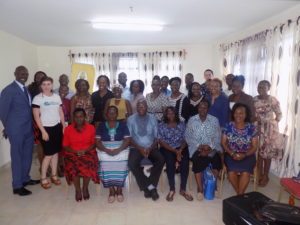By: Jacob B. Stocks & Sandra Yvonne Oketch – June 18th, 2019
On May 23rd, 2019, a stakeholders meeting on palliative care and treatment of cervical cancer for partners in Kisumu County was hosted at the KMET Complex in Kisumu. The main objectives of the meeting were 1) to share experiences on palliative care and cervical cancer services in Kisumu County and 2) to identify opportunities for networking and collaboration among partners.
 The 7-hour meeting began with a discussion of structural barriers to effective referral and treatment of cervical cancer in Kisumu County. The presenter, Brenda Otieno, discussed barriers such as the complexity of intra-facility referrals and client tracking, the lack of centrally located data on cancer patients (i.e. lack of a county-level cancer registry), and the lack of financial protection for clients seeking treatment. Following this session, Dr. Chemtai Mungo, an OB/GYN from UCSF, presented the evidence for cervical cancer screening via HPV testing by citing multiple studies discussing the cost-effectiveness and the increased sensitivity of HPV testing relative to VIA/VILI.
The 7-hour meeting began with a discussion of structural barriers to effective referral and treatment of cervical cancer in Kisumu County. The presenter, Brenda Otieno, discussed barriers such as the complexity of intra-facility referrals and client tracking, the lack of centrally located data on cancer patients (i.e. lack of a county-level cancer registry), and the lack of financial protection for clients seeking treatment. Following this session, Dr. Chemtai Mungo, an OB/GYN from UCSF, presented the evidence for cervical cancer screening via HPV testing by citing multiple studies discussing the cost-effectiveness and the increased sensitivity of HPV testing relative to VIA/VILI.
After a lively debate about the logistics of implementing HPV testing in Kisumu, Sandra Yvonne Oketch, Study Coordinator at the Kisumu Office of the Center for Global Reproductive Health, had the opportunity to highlight current efforts regarding cervical cancer prevention in Kisumu County including HPV testing via self-collection, the production and availability of Information, Education, and Communication (IEC) materials containing cervical cancer information that have been validated for use by community health volunteers (CHVs), the completion of a recent study on the motivations and experiences of CHVs, and a briefing on current stigma and mhealth studies.
 The stakeholders meeting concluded with an opportunity for attending partners to network and collaborate to improve the quality of services delivered in Kisumu County. The main focus of this time was the completion of a partner mapping exercise to identify the location and type of ongoing projects of different partners, in hopes of minimizing duplication of initiatives and realizing opportunities for partnership. We interacted with potential partners, including the SNAR Foundation – who utilize CHVs to offer cervical cancer awareness – and Maseno University, AIDS Control Unit. Following the meeting, interested partners, Cure Cervical Cancer and AFRICOG Foundation, visited with representatives from the Center to learn more about our HPV testing protocol.
The stakeholders meeting concluded with an opportunity for attending partners to network and collaborate to improve the quality of services delivered in Kisumu County. The main focus of this time was the completion of a partner mapping exercise to identify the location and type of ongoing projects of different partners, in hopes of minimizing duplication of initiatives and realizing opportunities for partnership. We interacted with potential partners, including the SNAR Foundation – who utilize CHVs to offer cervical cancer awareness – and Maseno University, AIDS Control Unit. Following the meeting, interested partners, Cure Cervical Cancer and AFRICOG Foundation, visited with representatives from the Center to learn more about our HPV testing protocol.
The next meeting will aim to engage all key stakeholders (i.e. the Ministry of Health [MOH], Partners, County Government, and community members) with the theme of building partnerships to increase cervical cancer awareness, screening, and treatment with a specific focus on CHV utilization.
